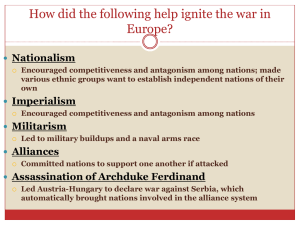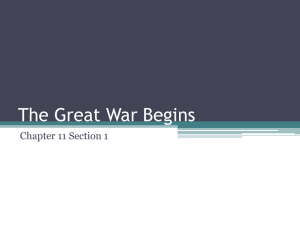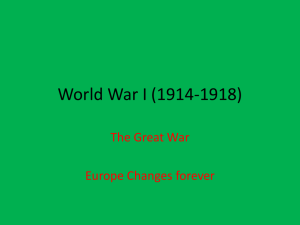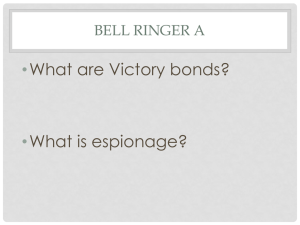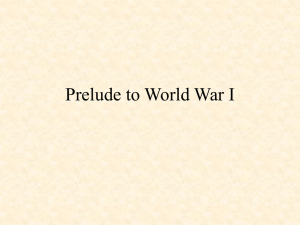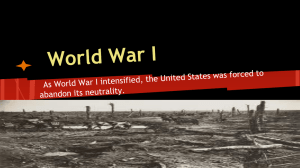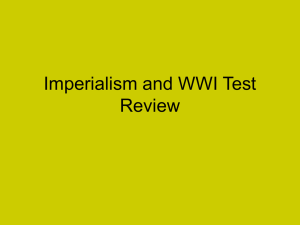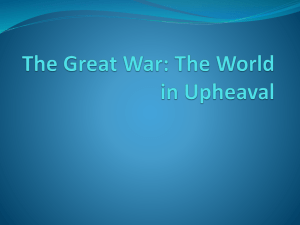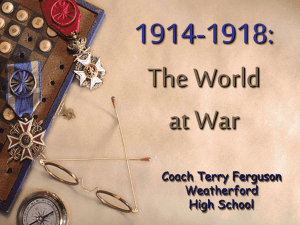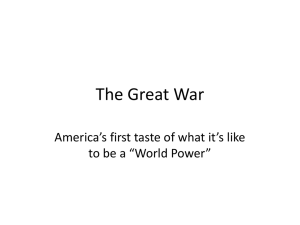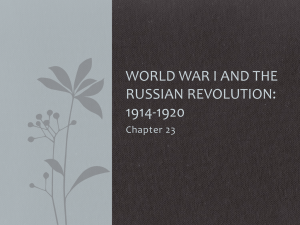Topic 1: causes, practices and effects of war
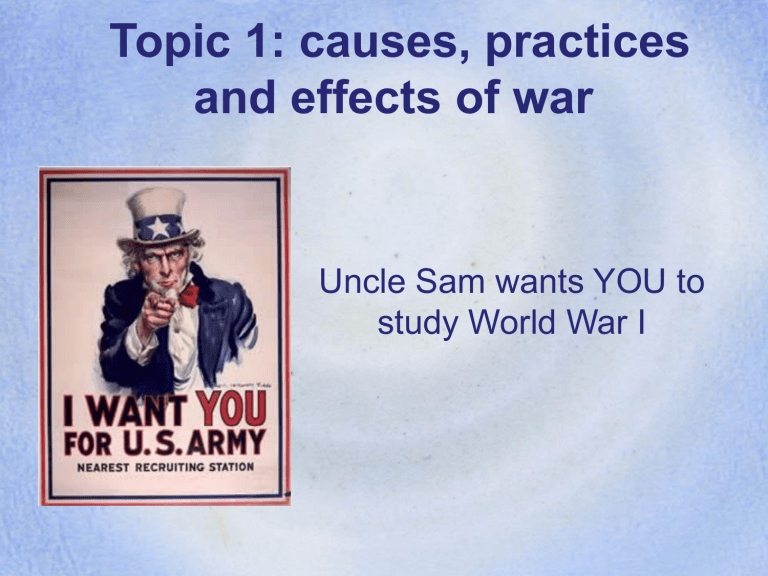
Topic 1: causes, practices and effects of war
Uncle Sam wants YOU to study World War I
Topic 1: 20th Century Warfare
Different types of 20 th Century warfare o Civil, guerrilla, limited, revolutionary o Total war
Origins and Causes of War o Long-term and short-term causes, failure of diplomacy o Economic, ideological, political, religious causes
Nature of 20 th Century Wars o Technological developments, tactics and strategies: air, sea and land o The home front, the role of women o Resistance and revolutionary movements
Effects and Results o Treaties, and wars ending without treaties o Political repercussions, territorial changes o Social and cultural effects, changes in the status of women o Post-war economic problems
Type of 20th Century Warfare
From the following list, how you would categorize the warfare of WWI? Why?
– Civil?
– Guerrilla?
– Limited?
– Revolutionary?
– Total?
Accepted Historical Perspectives on the cause of WWI:
Long term:
– Balance of power: Germany and Italy upsetting the “old European” status quo.
– Competition created by imperialism
– Aging and putrid empires created chaos as they crumbled: Ottoman, Austrian, Russian
Accepted Historical Perspectives on the cause of WWI:
Long term causes continued:
– England monopolizing the world’s finances
– Alliance system which was set to default to war
– German nationalism is the theory which was trumpeted after the war, but not before.
Diplomacy and Alliances
By 1900, a united Germany produced more steel than Britain and France combined.
– Germany felt it needed and deserved “a place in the sun”.
– German goods are sold, colonial competition begins and some countries look to the German Empire as a friend and protector.
Diplomacy and Alliances
The Triple Alliance:
– In 1879 Germany enters into a military alliance with Austria-Hungary.
– An alliance with Italy is added in 1882.
• (This alliance ends before WWI)
– To be safe, a “reinsurance” treaty is also signed with Russia.
• (This alliance lapses over time)
Diplomacy and Alliances
In 1894 France forms an agreement with
Russia. While the countries are different ideologically, France feels the pressure of the
Triple Alliance.
By this time, Europe is divided in two camps:
– German-Austrian-Italian
– Franco-Russian
Diplomacy and Alliances
What about Britain?
– Britain prided itself on a “splendid isolation”.
– Begins to feel pressure by a growing German navy
– Enters into a loose entente cordiale with France and Russia, but refused to make any military commitments.
Failure of Diplomacy
– Germany encourages Moroccan independence in an attempt to break the Entente, which makes it stronger
– Crisis in the Balkans as the Ottoman Empire crumbles: religious and political differences and begin to fuel unrest.
– The result was two wars in the Balkans, in which
Austria ultimately denied Serbian expansion to the sea.
Short-term Causes
The Union of Death also known as The
Black Hand assassinates Archduke
Franz Ferdinand in Sarajevo.
– Gavrilo Princip was the assassin who pulled the trigger.
– Ferdinand’s last words: “Sophie dear,
Sophie dear, don’t die! Stay alive for our children!”
Short-term Causes
Events that followed:
– Austria decides to crush Serbian independence.
– Germany gives Austria a “blank check” and encouragement to be firm.
– The Serbs counted on Russian support
– The Russians in turn counted on France who were terrified to face a war with Germany alone, give a
“blank check” to Russia.
Germany’s Blank Cheque to Austria-
Hungary:
“In the meantime His Majesty desires to say that he is not blind to the danger which threatens Austria-Hungary and thus the Triple Alliance as a result of the
Russian and Serbian Pan-Slavic agitation.”
Serbia’s Response to Austria-
Hungary
(Preamble) ...[Serbia] cannot be held responsible for manifestations of a private character, such as articles in the press and the peaceable work of societies ... [The
Serbian government] have been pained and surprised at the statements, according to which members of the Kingdom of Serbia are supposed to have participated in the preparations of the crime...
War Begins
– Russia mobilizes it’s army to the German and
Austrian boarders.
– Germany demands an end to mobilization of troops, gets no answer and declares war on
Russia on August 1, 1914.
– Germany also declares war on France on August
3, 1914.
– Britain declares war on Germany on August 4 only after neutral Belgium is invaded.
For you to consider:
– The effects of alliances, international markets, industrialism, imperialism/colonialism and nationalism during this time period.
– Other economic, ideological, political and religious causes of the war.
– Was this war truly inevitable? Were there possible steps that could have been taken to avoid war?
Nature of 20th Century War: War on Land
The Schlieffen Plan:
– Germany’s plan to use the excellent rail system to get troops quickly into France through Belgium and then turn “leisurely” to
Russia.
– During the Battle of the Marne, German troops are forced to retreat, France would not fall in a single blow.
Technology in war
– Aviation was barely beginning
– Motor transport was new, few tanks until late in the war
– Poison, tear and mustard gas used
– The most deadly weapon of the early war was the new machine gun, which made it impossible for soldiers to advance across open fields.
– This resulted in a long stalemate in the trenches.
Trench Warfare
From autumn 1914-spring 1918
1/3 of all Allied casualties were sustained in trenches.
– Rats--eating human remains could grow as big as cats. A single rat could produce 900 offspring a year.
– Lice!
– Trench Fever--severe pain followed by a high fever
– Frogs, slugs and horned beetles.
– Trench Foot-infection of the feet caused by the cold, wet and unsanitary conditions of the trenches.
Trench Warfare continued…
– Patrolling the dangerous areas of no-man’s land (the area between trenches)
– Boredom
– The smell--rotting carcases, overflowing latrines, dried sweat, rotting feet, lingering odor of poison gas and other smells of cooking/daily life.
Nature of 20th Century War: War at Sea
Land armies seemed helpless and both sides looked to the sea:
– The British impose a strict naval blockade, which divided good into two categories: contraband and noncontraband.
– The British tried to stop all goods going to
Germany in an attempt to starve out the enemy.
– Neutral countries were not allowed to enter any
German ports.
War at Sea continued..
Germany attempts to blockade Britain mainly through the use of submarines.
– Britain seems helpless to submarine attacks at first.
– Submarines were a new technology and it was hard to tell what kind of ship they were attacking.
– The Lusitania is torpedoed off the Irish coast on
May 7, 1915, killing 118 American citizens.
New Allies Needed
As the stalemate continued, countries begin to search for new allies:
– In 1914, the Ottoman Empire and Bulgaria in 1915 join with Germany and Austria.
– Both sides court Italy, the treaty of London promises Italy expanded territory.
– Germany promises an independent Poland
– In 1914, Japan declares war on Germany
– In the crumbling Ottoman Empire, many groups hope for independence.
The Question of the United States
President Wilson is reelected in 1916 with the slogan “he kept us out of war”
– Wilson could not see getting involved with either side, but he personally supported Britain and
France.
– He urged true neutrality, but the American people were divided.
• Many people had been born in Europe or were children of immigrants
• Several events lead to U.S. involvement….
The United States goes to war
– Germany announced unrestricted submarine warfare.
– The Zimmerman telegram, January 16,
1917, convinces Americans of German aggressiveness.
– On April 6, 1917 President Wilson went to
Congress for a declaration of war“to make the world safe for democracy”.
For you to consider:
Other technological developments in
WWI.
What was happening on the home front during this time?
What was the role of women?

